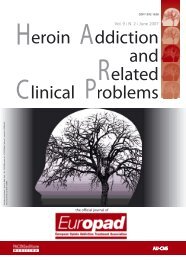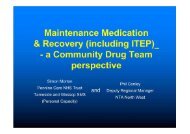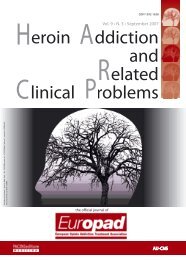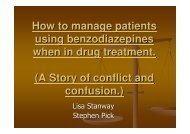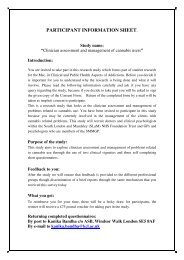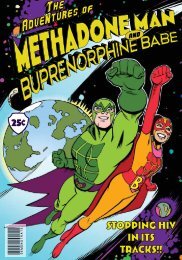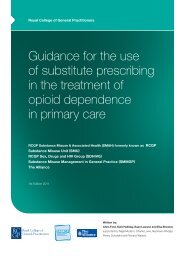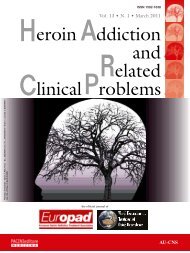cocaine guidance - Royal College of General Practitioners
cocaine guidance - Royal College of General Practitioners
cocaine guidance - Royal College of General Practitioners
- No tags were found...
You also want an ePaper? Increase the reach of your titles
YUMPU automatically turns print PDFs into web optimized ePapers that Google loves.
7Guidance for working with <strong>cocaine</strong> and crack users in primary careOngoing care in the surgeryWhen working with drug users it is essential to undertakeongoing monitoring <strong>of</strong> health like other medical conditions.It is recommended that regular health checks take placeto monitor progress and provide appropriate interventions(e.g. on a 3 to 4 monthly basis).The review should:■ Review recent drug and alcohol taking.■ Ask about recent risk <strong>of</strong> blood borne viruses(HIV and hepatitis) and check hepatitisvaccinations are complete.■ Ask about changes in their health including changesin their weight, breathing difficulties, palpitations,chest pains.■ Undertake a general physical check <strong>of</strong> the skinfor burns and injecting damage and nose forseptum damage.■ Monitor weight and note changes..■ Take the blood pressure. If it is high it is worthrepeating as it may reflect recent use.■ Monitor the peak flow rate.■ Check pulse rate for arrhythmias.■ Sexual health including use <strong>of</strong> contraception andcondoms, last smear and recent STIs.■ Monitor recent mental health, ask about recentproblems and significant episodes.For a suggested plan for your review,please see Appendix 2.Motivating changeOver time when trust is built up, it is helpful to ask usersabout the areas <strong>of</strong> their life that are important to themsuch as the drug, health, housing, relationships (socialand sexual), children and financial stability. Consider theareas identified by the user and ask them to place themin the order <strong>of</strong> current importance.Treatment options in the surgeryPsychological interventionsThese are arguably the most useful <strong>of</strong> the treatments,but will for the most part be conducted outside <strong>of</strong> thesurgery. All treatment is improved by a positive, nonpunitiverelationship with a key person, such as theGP or drug worker. For more details see page 9.Prescribed medicationPrescribed medication should never be used in isolationfrom a whole package <strong>of</strong> care, including relapse prevention.In light <strong>of</strong> the results <strong>of</strong> trials on a large number <strong>of</strong> drugs,it would seem reasonable to conclude that drug therapyis only effective for the most part in treating individualsymptoms such as depression or insomnia (short-termonly) after crack or other stimulant use has ceased.There is no substitute medication, although many havebeen tried, and care must be taken not to attemptpharmacological treatment where there is little or noevidence base for such an intervention. Psychologicaltherapies still remain the mainstay <strong>of</strong> treatment.Benzodiazepines short term can be useful to helpagitation, to relax and to help sleep. They should onlybe used in low doses (starting 30 mg or less <strong>of</strong> diazepamdaily and reducing rapidly) and short-term (less than2 weeks). Remember they have their own addictivepotential.Antidepressants such as selective serotonin reuptakeinhibitors and l<strong>of</strong>epramine are important only if underlyingdepression is confirmed. They should only be initiatedafter crack or stimulant use has ceased and SSRIs shouldbe used with caution if <strong>cocaine</strong> use continues, because<strong>of</strong> the rare occurrence <strong>of</strong> the ‘serotonergic syndrome.’Reboxetine, a selective inhibitor <strong>of</strong> noradrenalinre-uptake, is also being tried.For more details about the issues surroundingprescribed medication, please see Appendix 3.a. Do they want this order to change, why and how?b. Where would the user like to aim towards in allthese areas <strong>of</strong> their life?



